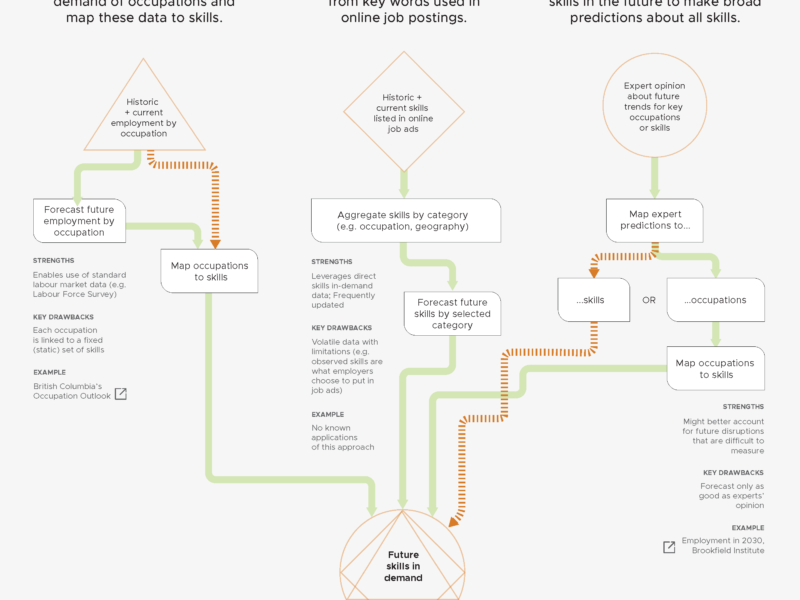
Project INSIGHTS REPORT
Early childhood education training lab
Executive Summary
Even before the increased demand brought on by the Canada-wide Early Learning and Child Care agreements, early childhood educators (ECEs) were increasingly being called on to obtain more skills and credentials, without a parallel increase in wages, benefits, or improvements in working conditions. If wages and working conditions do not improve, there is concern that there will not be enough qualified ECEs to implement the national program.
This project delivered social innovation labs to develop prototypes that would respond to two questions:
- How might we support educators in getting ECE qualifications while working to deliver quality early learning and childcare?
- How might we create the conditions for thriving work experiences for operators and educators?
Stakeholders from across the Atlantic provinces came together over two rounds to develop eight prototypes that were tested in a handful of childcare centres. The testing yielded promising ideas that merit further exploration, while the social innovation lab process strengthened relationships and developed common understanding of challenges across the network. The project echoes findings from other industries and sectors on the important role supervisors and managers play in the access a worker has to professional development opportunities.
Key Insight #1
In Atlantic Canada, close to 10,000 educators provide care and learning for more than 60,000 children.
Key Insight #2
Less than half of ECEs are satisfied with career opportunities.
Key Insight #3
60% of ECEs work in the same position as when they started.
 The Issue
The Issue
Quality of work issues have given rise to shortages of trained early childhood educators (ECEs) across Canada. This is being felt acutely in Atlantic Canada as pre-K programs are being expanded and legislative changes now require post-secondary credentials for educators and a greater percentage of educators per centre. The demand for innovation and support for a resilient and quality ECE workforce is front and centre as Canada works toward a national $10/day childcare plan.
Over the last decade, ECE work has become more technically demanding, but wages, benefits, hiring practices, leadership, and human resource support have not kept up. Wage remedies implemented in the last few years and the ones coming with the federal bilateral agreements are important first steps in resolving this systemic dysfunction — especially as wages are the top concern among ECEs. But they are not enough on their own. If working conditions do not change, the sector is likely to see continued educator burnout and recruitment and retention struggles, with negative implications for children and parents who rely on the ECE system. It is critical to resolve these workforce challenges for the roll-out of a national childcare program to be successful.
 What We’re Investigating
What We’re Investigating
NouLab is a social innovation lab based at the University of New Brunswick that brings together teams of stakeholders to design solutions to various socio-economic problems that prioritize user voices in the design of solutions that impact them. Aiming to reduce labour force disruptions in the sector, NouLab convened an ECE social innovation lab to bring together previously siloed ECE stakeholders to produce prototype solutions that are more representative of the whole ECE system. Each round of the social innovation lab included groundwork, discovery, design sprints workshops/ideation, concept and field testing, and discussion of results with stakeholders.
Round 1: July 2020-Dec 2021
The first round of the social innovation lab sought to answer the question: “How might we support educators in getting ECE qualifications while working to deliver quality early learning and childcare?”
The first round generated 4 prototypes, that were tested at one or two childcare centres in Atlantic Canada:
- New Brunswick study leave: Provided financial and operational assistance to cover one shift per week for 12 weeks for a seasoned practitioner enrolled in an ECE course at New Brunswick Community College.
- New Brunswick prior learning assessment and recognition: Created an easy-to-understand storyboard to illustrate the process educators go through from considering going back to school to becoming certified via a prior learning assessment and recognition process.
- Prince Edward Island embedded mentorship: Developed a job description for a mentor-educator role within child care centres, offered a half-day workshop on ECE mentorship followed by an anonymous peer nomination process to identify educators to take on mentor roles, and two community-of-practice sessions to exchange learning among identified mentors.
- Newfoundland & Labrador administrative support for educational pathways: Developed a self-assessment questionnaire for administrators on support for ECE professional development, a three-part virtual workshop for administrators and a visual of the educational pathway from uncertified to certified.
Round 2: April 2022-July 2023
Based on learning from round 1, the second round of the social innovation lab tried to answer: “How might we create the conditions for thriving work experiences for operators and educators?”
Round 2 generated four more prototypes that focused on the role of centre directors and operators:
- New Brunswick peer-to-peer support cohort for directors: Offered opportunities for directors to come together in hopes of supporting pedagogical leadership by collectively addressing challenges and learning together.
- New Brunswick placement of pedagogical leaders: Developed a process to support centres with the placement of peer-nominated pedagogical leaders in centres across New Brunswick in both rural and urban settings.
- Prince Edward Island learning buddy: Developed a program where pairs of directors, supported by a coach, participated in a leadership self-evaluation and goal-setting process together.
- Newfoundland & Labrador close out day support: Developed supports for centres that have never held a professional learning close out day before, including support to access funding to cover costs.
Round 2 prototypes were still in the field at the time of project closing, so only preliminary results were available.
 What We’re Learning
What We’re Learning
Expanded networks and strengthened trust
The social innovation lab process strengthened the network of stakeholders working on early childhood education in Atlantic Canada. It brought together different government departments working on early learning and childcare from New Brunswick, Newfoundland & Labrador, and Prince Edward Island; colleges offering ECE programs including New Brunswick Community College, Holland College, and the College of the North Atlantic, and sector associations including the Association of Early Childhood Educators in Newfoundland & Labrador and the Early Childhood Development Association of P.E.I. Representatives from these groups worked towards consensus on the core challenges and generated and tested ideas to make change. Diverse sector representation enabled development of realistic implementation strategies that could work within or circumvent constraints and ensured that ideas were not duplicating similar existing efforts. For the most part, the lab process did not introduce new relationships, rather it was a chance to deepen connections with people they previously had limited interactions with (e.g. through email exchanges).
Expanded content expertise
The process of gathering and sharing evidence, with a skilled facilitator to assist participants in the interpretation, allowed for the group to move towards consensus on the key challenges and the barriers that existed to resolving them. Lab participants who were new to the sector or had recently moved into a new role found the lab provided the greatest insight into new perspectives on the challenge and system.
There is more than one way to encourage ECEs to pursue credentials and professional development and create the conditions for thriving work experiences for operators and
educators. While challenges emerged in response to the prototype testing, most of the prototypes held potential to be expanded and tested further. The diversity of prototypes generated reflect regional differences and suggest a multi-pronged strategy for tackling these complex challenges.
When efforts are scaled to the next level, outcomes for participants should be more closely monitored to measure success and make the case for further scaling or adaptation. Ongoing efforts to share experiences and reflections on the prototyping work will help good ideas spread.
Innovation work requires intensive support
Given the existing and growing strains on the early-years sector, participants had very limited time for the social innovation lab. In respect of this, an experienced design coach and facilitator was assigned to each team who facilitated discussion during meetings and synthesized data in between meetings to develop ideas and bring those back to the groups for feedback. This allowed participants to fully participate in the co-creation of a prototype and the concept of something to be tested in the field in a way that made the most of their expertise. One area for improvement in process would be devoting more resources and structured support to monitoring and learning from the prototype testing. This type of support would facilitate reflection, learning and adaptation during implementation, and ensure adequate documentation to support scaling decisions going forward.
Unexpected outcomes from coming together
A regional Francophone team with stakeholders from across Atlantic Canada decided it would be valuable to develop a Francophone regional ECE association to participate and share recruitment materials, training opportunities, and be a common voice for Francophone ECE training in the region. The project supported this group with the prototype fund of $18,000 and was able to leverage that investment to secure another $80,000 from Le Réseau de Développement Économique et D’employabilité. The combined investment let the group hire a consultant to develop a prototype of what the association could offer to the Francophone ECE Sector in Atlantic Canada.
 Why It Matters
Why It Matters
The Canada-wide Early Learning and Child Care system is making progress towards $10/day childcare for parents. Central to negotiations in all provinces and territories was the need for better quality of work, including higher wages and more professional development for early childhood educators, most of whom are women. This project offers lessons about how to increase skills acquisition for ECEs, and how to develop the capacity of directors and operators to support a culture of learning and professional development.
Beyond wages and working conditions, this project highlighted that administrative burden was a key barrier to supporting skill development in early childhood education. This echoes findings from other sectors on the important role supervisors and managers play in a worker’s access to skills development opportunities, and may be a factor in other care sectors like long-term care and healthcare. Policy makers should be looking at a whole sector approach when determining what is necessary and required of administrators. By attempting to reduce administrative burden with a cohesive policy and regulatory environment, quality of care along with productivity could improve.
Given the amount of change the sector faces, there is very little capacity to continue to iterate on the learnings or implement or pilot the existing prototypes without external support. In the prototype tests, NouLab covered all of the costs for centres and ECEs. It is unlikely that centres could take up these solutions without subsidies. Further experimentation is needed to determine the viability of the prototype solutions and the appropriate financial structures through which to pay for them. A larger scale pilot of the prototypes might allow policy makers to better assess the cost-benefit ratio of subsidizing paid study leave, for example.
In addition to the practical lessons, the social innovation lab process strengthened relationships among key actors in the early childhood education and childcare system in Atlantic Canada. This experience will hopefully support the resilience of this network during the changes brought by the Multilateral Early Learning and Child Care agreements.
 What’s Next
What’s Next
Based on a prototype from round 1 of the project, the government of New Brunswick hired Noulab to conduct a feasibility study for a substitute database for educators.
Noulab was also sought out by the Public Policy Forum to contribute to its childcare research, An Investment that Works for Child Care, contributing provincial workforce snapshots for New Brunswick, Prince Edward Island, and Newfoundland & Labrador.




